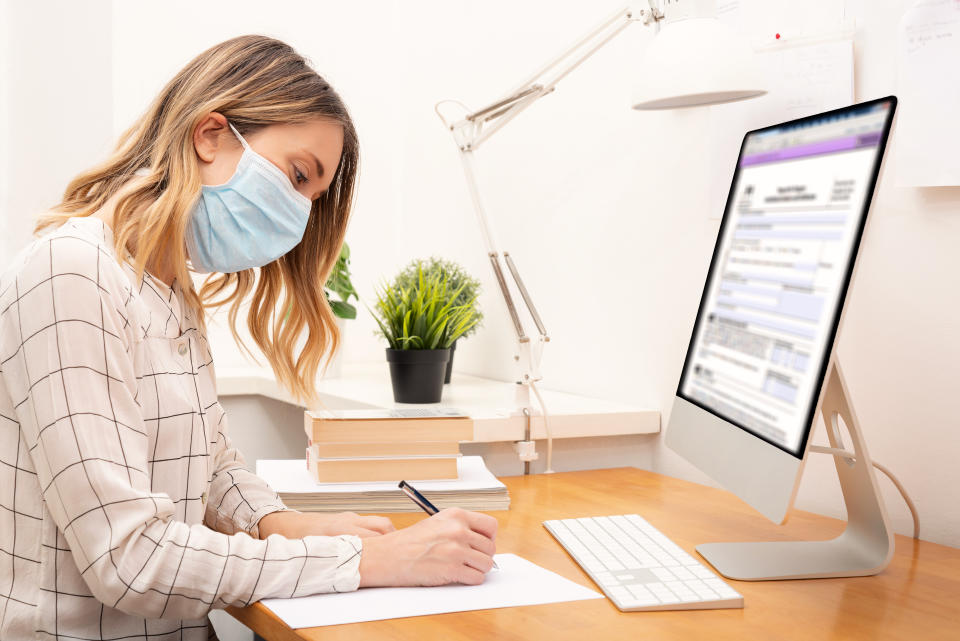Lockdown has us working an extra 28 hours a month - and it could take its toll on our mental health
Working from home amid the coronavirus outbreak means the average Briton is putting in 28 hours overtime a month, a survey has suggested.
Boris Johnson has introduced extreme restrictions that only allow people to leave their home for “very limited purposes”, like shopping for essentials.
While NHS and social care workers on the front line are more stretched than ever, those who can set up office in their kitchen have been told to do so.
A survey of 2,000 people by LinkedIn and The Mental Health Foundation found at-home workers are staying logged on well beyond their shift, with all this overtime building up over the month.
More than half (56%) of those surveyed complained of feeling anxious or stressed amid the unprecedented pandemic.
Early research suggests the coronavirus is mild in four out of five cases, however, it can trigger a respiratory disease called COVID-19.

Just under a quarter (24%) of those surveyed claimed to be struggling with their mental health.
Nearly a third (31%) complained of insomnia. Waking in the night is thought to be causing Britons to remember vivid dreams, while all that tossing and turning is leaving many feeling groggy first thing.
Latest coronavirus news, updates and advice
Live: Follow all the latest updates from the UK and around the world
Fact-checker: The number of COVID-19 cases in your local area
Explained: Symptoms, latest advice and how it compares to the flu
The pandemic has hit the UK economy hard, with thousands of British workers being made redundant or furloughed.
Almost half of those surveyed (47%) admitted to pretending to be busy while WFH over fears they could lose their job if not.
A quarter (25%) felt under pressure to respond to work requests more quickly than normal and “stay online” beyond the end of their shift.
Some 12% said they log on before 7am, while nearly one in five (18%) are still working 12 hours later.
Experts worry heightened stress and longer hours may leave workers at risk of burn out.
The World Health Organization (WHO) listed burn out as an “occupational phenomenon” in its International Classification of Diseases last year.
While not a medical condition, the global body claims stretching yourself too thin can “influence health status or contact with health services”.
The WHO defines burn out as “a syndrome resulting from chronic workplace stress that has not been successfully managed”.
“Burn out, which is caused by unmanaged chronic workplace stress, is a modern phenomenon that poses a huge risk to our physical and mental health,” said Chris O’Sullivan from The Mental Health Foundation.
“People working from home during these unprecedented times are at a greater risk of burn out due to the high stakes environment we find ourselves in both globally and personally.
“We cannot have the same business as usual expectations on ourselves or of our employees – there simply aren’t enough hours in the day to work full time, look after children at home and keep up our other responsibilities,” the Metro reported.
O’Sullivan recommended workers stick to a routine, take advantage of down time and speak to their manager if it all gets too much.
This has been echoed by other experts.
Professor Barbara Larson from Northeastern University in Boston previously told the BBC: “Have really clear-set expectations for communications day-to-day.
“Ask [your manager] if they don’t mind having a 10-minute call to kick off the day and wrap up the day.”
While it may be easier said than done, experts have also stressed fretting is futile.
“Focus on your circle of influence, in other words, control your ‘controllables’,” Dr Meg Arroll, chartered psychologist for Healthspan, previously told Yahoo UK.
“You can control how much you check the news and your response to the story.
“If you’re feeling very anxious, practice some self-care with whatever works for you – going for a walk, having a long bath – to reset an anxious mind”.

Coronavirus: Mental health impact may be ‘profound’
The LinkedIn survey is not the first time mental health concerns have been raised amid the coronavirus lockdown.
Scientists from all over the world previously warned the restrictions could have a “profound” and “pervasive” impact on people’s emotional wellbeing for some time to come.
The government has even released advice on how we can protect our mental health during the pandemic by staying connected with others, sharing our concerns and focusing on the present.
Critics argued, however, the recommendations do not go far enough, with one saying they are “largely geared at the middle class”.
The survey also revealed some positives of WFH, however.
Just over two in five (44%) claimed to be feeling more connected to their family.
A quarter (24%) said WFH has given them time to exercise, while 17% are eating more healthily.
More than half (54%) believe working from home has real benefits and would like the option to continue doing so when lockdown eases.




